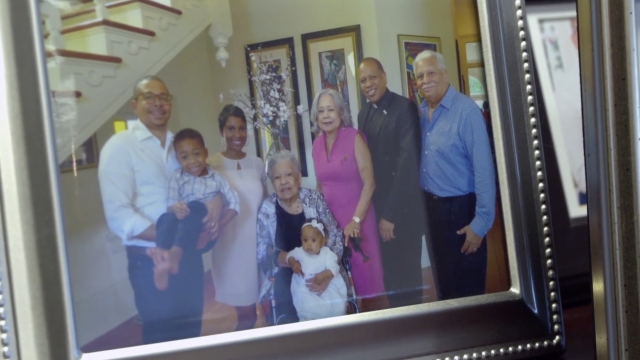In New Orleans, a city rich in history and culture, a father-son duo is working to make the future wealthier for all.
Alden McDonald Jr. says he didn't come from money but was rich in other ways.
"I developed a lot of skills, working skills and personal skills back then because we had to hustle. We had to hustle to make a living," McDonald Jr. told Scripps News.
As a waiter working an event in the 1960s, he was approached about the need for Black bankers.
"I've always had more than one job, and the job that I had at the time, I got off at 3:00. So I said, well, I'll go work part-time," he recalled.
McDonald Jr. says he worked hard getting to know a business he admittedly knew nothing about, and eventually became vice president.
"Back in '66, it was still pretty much a segregated community, but you know, when things have to get done, color wouldn't matter, right? So if I was willing to do the work, if I was willing to stay at 1, 2 in the morning, that's what they enjoyed. That's what they liked," he said.
In 1972, a new bank, led by Xavier University of Louisiana President Norman C. Francis, would ask McDonald Jr. to join their ranks, and the rest is history. He went on to become the president and CEO of Liberty Bank and Trust.
Today it's one of the largest Black-owned banks in the nation, with more than a billion dollars in assets and branches in 11 states.
McDonald Jr. says that success is built on seeing people differently.
"They used to tell me that the definition of a banker is a person who gives you an umbrella when the sun is shining and the first one to take it away when it starts to rain, so I didn't want to be that banker, right? " he said with a laugh.
Hurricane Katrina would put that mantra to test.
"We lost 90% of our customer base, 90% our employee base, we lost all of our branches," McDonald Jr. said. "We had to literally start all over again."
SEE MORE: Power of the Black dollar: Funding entrepreneurs in tech
While some were forced to close, leaving residents without access to funds or loans, McDonald Jr. and Liberty Bank and Trust stayed, with McDonald Jr. himself working the front lobbies and taking notes by hand since the computer systems were down.
"They had to have money to get an apartment. They had to have money to buy bedding, kitchen stuff, utensils," he recalled.
Howard University professor of finance Denise Streeter says Black-owned banks have long been important in moments of adversity, formed to fill in the gaps of discrimination and mistrust.
"They had to just out of necessity because then also post-Civil War, we had redlining, we had housing discrimination, we had restrictive deed covenants and so forth," she said.
She says many Black-owned banks are still important today.
"They started to fill the gaps even recently during the COVID pandemic that people were not getting the business loans ... from the larger banks, and then had to go to the Black-owned banks to get PPP loans, for example, to pay their staff," Streeter said.
According to the Brookings Institution, wealth is increasing for Americans, but that didn't change the wealth gap between Black and White Americans — a gap that's often closed through entrepreneurship and homeownership.
"Generational wealth is being able to have some transfer of legacy of income-producing properties. Even if it's a home, it can be income-producing because it's going to have equity at some point and be able to be sold or collateralized so that others can benefit," Streeter explained.
SEE MORE: First minority-owned stock exchange opening doors for Black business
A new report from The National Association of Realtors shows a "modest uptick" in the rates of Black homeownership in 2022, but the rates are still trailing behind other minority groups like Asians and Hispanics, who saw much larger increases.
That report also pointed out higher rates of mortgage denials among Black people, who were also less likely to get a down payment from family members.
"Some of the most wealthiest people in the world have real estate behind them, because you know you can't make more of it," explained Todd McDonald.
In 2022, McDonald Jr. passed the baton to his son Todd, who says the family motto of people first and economic freedom still stands, focusing now on homeowners.
Their community restoration programs lend to people acquiring and fixing up homes in low-income communities, provided they live in the home and take a home-buyers education course.
"Capital is key. Unfortunately, that keeps a lot of businesses, especially businesses of color, out of opportunities," said Todd McDonald.
He says they also help businesses looking to grow in the community.
"As a community banker, you have to learn how to separate your feelings from the actual business itself and just make the focus on helping people," he explained.
All the while, he's learning from the man who laid the foundation.
"I know my dad's thinking not as Alden, but as, 'Hey, this is a blessing.' I'm just part of the blessing. So how do we, you know, keep navigating this?" he continued.
It's all a part of building wealth, in all the ways that matter.
"Whether the wealth is in the form of money, whether the wealth is in the form of education, whether the wealth in the form of just loving people and helping people do things, that's generational wealth to me," said McDonald Jr.
Trending stories at Scrippsnews.com



